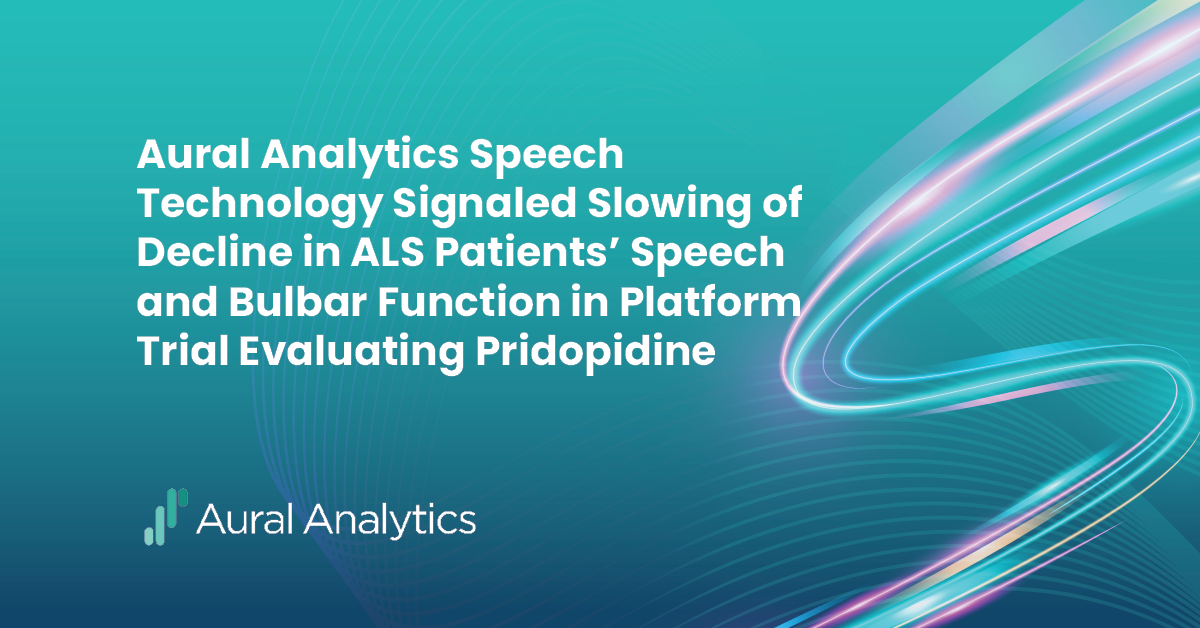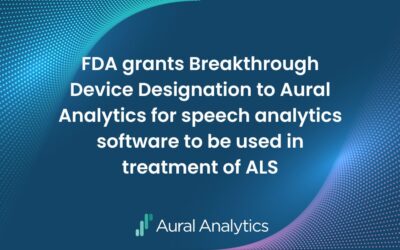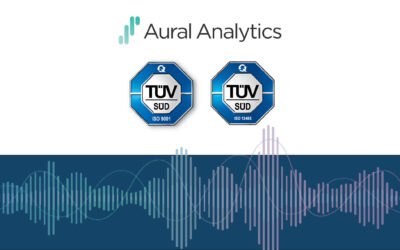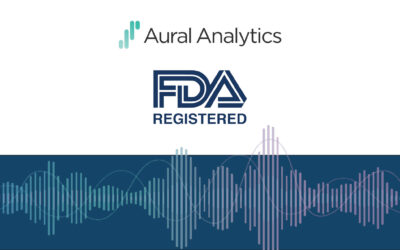In a clinical trial evaluating Pridopidine vs. placebo in adults with ALS, Aural Analytics’s speech analytics platform suggested slowing of decline in several markers related to speech and bulbar function in participants taking Pridopidine, while the primary endpoint did not meet the criterion for success.
PHOENIX – February 24, 2023 – Aural Analytics, Inc., a leader in clinical-grade speech analytics, today announced that its speech analytics platform facilitated differentiation and provided critical insights into the effectiveness of Pridopidine in clinical trials. This is the first time that a speech-based digital biomarker has suggested efficacy as a novel therapeutic for a neurological condition in a large-scale pre-registered interventional trial. The results represent an exciting opportunity for a speech-based digital biomarker to aid precision medicine and sets the stage to approach the FDA, for the first time ever, to include a digital primary endpoint for a neurological condition in a phase III clinical trial.
Pridopidine is a highly selective sigma-1 receptor (S1R) agonist developed by Prilenia Therapeutics for the treatment of neurodegenerative disorders. S1R regulates cellular pathways that are commonly impaired in neurodegeneration, including those implicated in bulbar and speech function in people living with ALS. The Pridopidine Trial was being conducted as part of The HEALEY ALS Platform trial, which was designed to accelerate the development of treatments by testing multiple drugs for individuals with ALS. Testing Pridopidine was Regimen D, an informative Phase II study.
A potentially important finding in the Regimen D results released yesterday by The Sean M. Healey & AMG Center for ALS at Massachusetts General Hospital (MGH) and the Northeast ALS (NEALS) Consortium was the slowing of decline of voice characteristics in adults taking Pridopidine versus adults taking placebo. While a general measure of overall function did not meet the criterion for success, Aural Analytics’s measures, selected because of the mechanism of action of the drug, provided evidence that the drug preserves speech and bulbar function in patients. The speech-motor module of Aural Analytics’s clinical-grade speech analytics platform, Speech Vitals, was used to measure specific metrics of an individual’s speech via a smartphone app that regularly captured speech from participants. Participants taking Pridopidine demonstrated slowing of decline in speech production attributes, including sustained phonation, speaking rate, articulation rate, and articulatory precision compared to study participants taking placebo. Additionally, slower decline was noted for speaking rate and articulation rate for participants who were in an early stage of the disease. As impaired speech in ALS negatively impacts quality of life, improvements in these speech measures are likely to have meaningful impact for those living with ALS and their families.
“Maintaining useful speech is critically important to people with ALS; in addition, speech function also predicts swallowing and breathing. An accurate speech measurement tool therefore has the potential to play a critical role in ALS therapy development,” said Dr. Jeremy Shefner, Regimen Lead for Prilenia and collaborator with Aural Analytics on ALS natural history studies.
The promise of digital biomarkers for translational precision medicine, or tailoring drugs to specific subsets of disease, has long been speculated. The results of Regimen D serve as proof that digital measures, and more specifically Aural Analytics’s Speech Vitals platform, can help researchers prove the efficacy of drugs mapped to specific disease symptoms.
“Aural Analytics is dedicated to the use of clinical-grade speech analytics to assist clinical researchers in capturing accurate insights for diseases,” said Justin Yap, CEO of Aural Analytics. “We are excited about the results of the Regimen D trial and see a promising pathway to using Aural Analytics’s Speech Vitals platform as a primary endpoint and an exciting opportunity in precision medicine. We look forward to collaborating on the next steps of this drug development program.”
Aural Analytics is a leader in the speech analytics market, and is currently supporting research across a variety of motor diseases. Its powerful speech-motor module was responsible for the demonstration of the effectiveness of Pridopidine and validates Speech Vitals’s value in supporting research across a wide range of neurodegenerative diseases, such as Parkinson’s and ALS.
About Aural Analytics, Inc.
Aural Analytics is the industry’s leading speech neuroscience company working with leaders in clinical research and the healthcare setting. Its easy to use Speech Vitals platform leverages structured speech elicitations to measure validated objective disease relevant information directly from patients in remote and clinical settings. For more information, please visit auralanalytics.com or follow Aural Analytics on Twitter, LinkedIn, and Facebook.
About the Sean M. Healey & AMG Center for ALS at Mass General
The Sean M. Healey & AMG Center for ALS at Mass General is on a quest to discover life-saving therapies for all individuals affected by ALS. Launched in November 2018, the Healey Center leverages a global network of scientists, physicians, nurses, caregivers, people with ALS and families working together to accelerate the pace of ALS therapy discovery and development.
About Massachusetts General Hospital
Massachusetts General Hospital is the original and largest teaching hospital of Harvard Medical School. The Mass General Research Institute conducts the largest hospital-based research program in the nation, with annual research operations of more than $1 billion and comprises more than 9,500 researchers working across more than 30 institutes, centers and departments. In July 2022, MGH was named #8 in the U.S. News & World Report list of “America’s Best Hospitals.”





